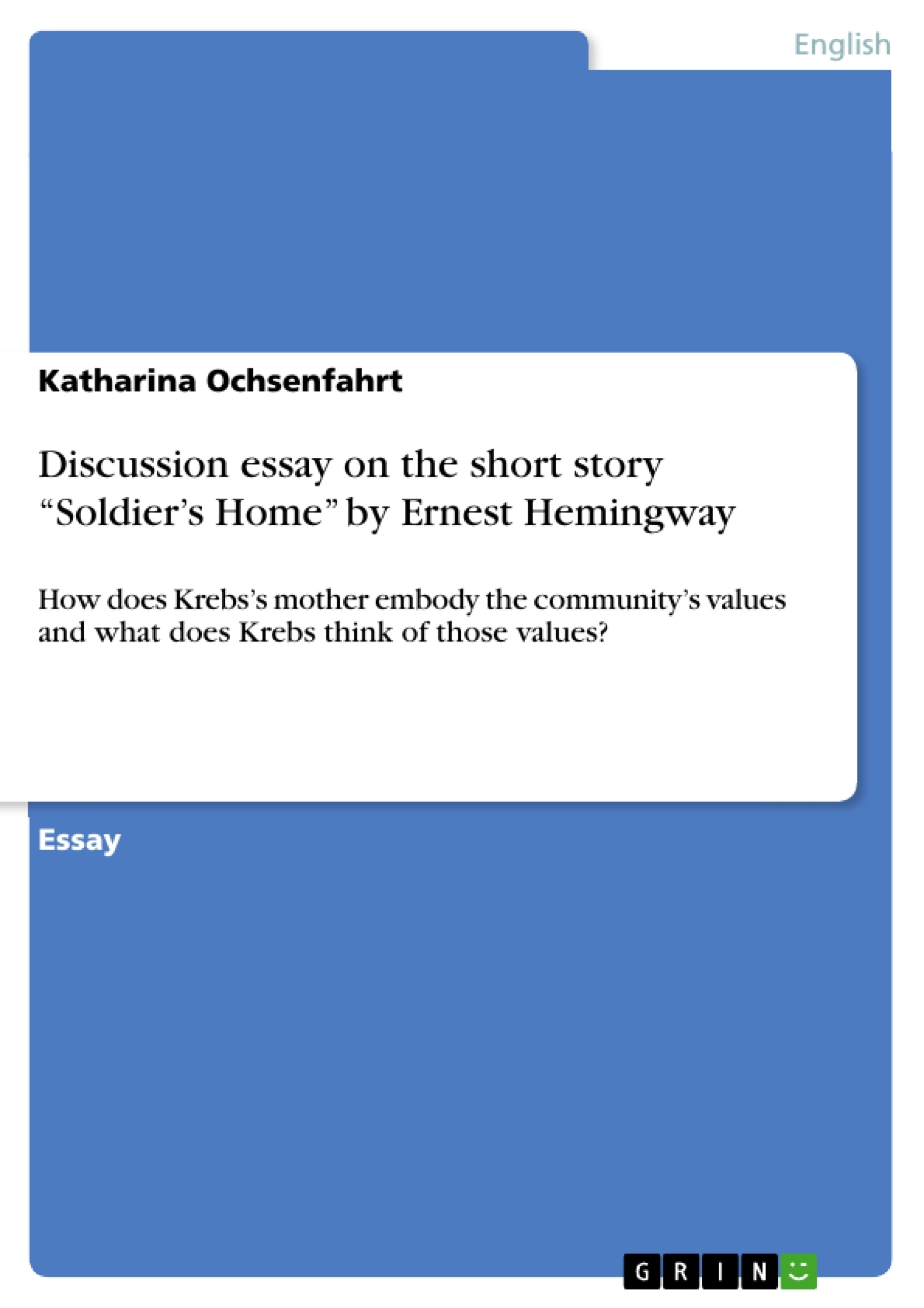Relationships between parents and their children are never easy, because they belong to different generation, and have therefore different values in life. This often leads to conflicts. But in the short story Soldier’s Home by Ernest Hemingway the protangonist Krebs and his mother do not have an usual generation conflict. Krebs has a changed character, because he has been to war. He does not have an aim in his life anymore. Krebs’s mother embodies the community’s values, and she makes Krebs start an adult life against his will. This includes that she encourages him to find a job, and a girlfriend. Moreover, she wants him to believe in God, and to show affection for her and the rest of the family.
Table of Contents
- Unusual generation conflict
- Mother influences Krebs
- Find a job
- Get a girlfriend
- Believe in God
- Show feelings
- Krebs's new life
Objectives and Key Themes
This essay analyzes Ernest Hemingway's "Soldier's Home," focusing on the complex relationship between Krebs and his mother. The objective is to examine how the mother embodies societal values and how Krebs responds to them, highlighting the generational conflict stemming from Krebs's wartime experiences.
- Generational conflict and differing values
- The impact of war on individual identity and relationships
- Societal expectations and pressure to conform
- The role of family in shaping individual behavior
- The struggle between personal desires and societal pressures
Chapter Summaries
Unusual generation conflict: This section introduces the central conflict between Krebs and his mother, arising from their differing values and perspectives. Krebs, traumatized by his war experiences, struggles to reintegrate into civilian life and rejects societal norms. His apathy and emotional detachment contrast sharply with his mother's desire for him to conform to traditional expectations of employment, marriage, and religious faith. The inherent tension between Krebs's post-traumatic state and his mother's attempts to guide him establishes the primary conflict of the story.
Mother influences Krebs: This section details the various ways Krebs's mother attempts to shape his behavior and values. She pressures him to find a job, obtain a girlfriend, and reconnect with his faith. Each attempt reveals the values prioritized by the community: economic stability, social conformity, and religious devotion. Krebs's resistance to his mother's influence highlights his internal struggle and his difficulty in reconciling his wartime experiences with his mother's expectations. The section emphasizes the societal pressures that shape the conflict between mother and son.
Krebs's new life: This section summarizes the ultimate outcome of the mother's influence on Krebs. While Krebs initially resists his mother's attempts to steer him toward a conventional life, he ultimately decides to go to Kansas City to find work. This decision, however, is motivated primarily by his desire to appease his mother rather than his own aspirations. This section showcases the enduring power of familial influence, despite Krebs's emotional detachment and reluctance to conform to societal expectations. It concludes by highlighting the lasting impact parents have on their children, even when those children are deeply affected by trauma and struggle with reintegration into society.
Keywords
Generational conflict, societal values, post-traumatic stress, family relationships, war trauma, conformity, societal expectations, mother-son relationship, emotional detachment, religious belief.
Frequently Asked Questions: Ernest Hemingway's "Soldier's Home"
What is the main focus of this analysis of Ernest Hemingway's "Soldier's Home"?
This analysis focuses on the complex relationship between Krebs and his mother, exploring the generational conflict stemming from Krebs's wartime experiences and his mother's attempts to impose societal values upon him.
What are the key themes explored in the essay?
Key themes include generational conflict and differing values, the impact of war on individual identity and relationships, societal expectations and pressure to conform, the role of family in shaping individual behavior, and the struggle between personal desires and societal pressures.
What is the central conflict in "Soldier's Home"?
The central conflict arises from the clash between Krebs's post-traumatic state and his mother's attempts to guide him towards a conventional life, incorporating societal expectations of employment, marriage, and religious faith. Krebs's apathy and emotional detachment directly oppose his mother's values.
How does Krebs's mother try to influence him?
Krebs's mother pressures him to find a job, get a girlfriend, and believe in God. These actions highlight the societal values of economic stability, social conformity, and religious devotion that she wants Krebs to embrace.
What is the outcome of the mother's influence on Krebs?
While initially resisting, Krebs ultimately decides to go to Kansas City to find work. This decision, however, is primarily motivated by a desire to appease his mother rather than his own aspirations, showcasing the enduring power of familial influence despite his trauma and reluctance to conform.
What are the key takeaways from this analysis?
The analysis emphasizes the enduring impact of family relationships, the challenges of reintegrating into society after war, the struggle between individual desires and societal pressures, and the complexities of generational conflict fueled by differing values and experiences.
What are the keywords associated with this analysis?
Keywords include: Generational conflict, societal values, post-traumatic stress, family relationships, war trauma, conformity, societal expectations, mother-son relationship, emotional detachment, and religious belief.
What is included in this language preview?
This preview includes the title, table of contents, objectives and key themes, chapter summaries, and keywords.
- Quote paper
- Katharina Ochsenfahrt (Author), 2008, Discussion essay on the short story “Soldier’s Home” by Ernest Hemingway, Munich, GRIN Verlag, https://www.grin.com/document/151090




